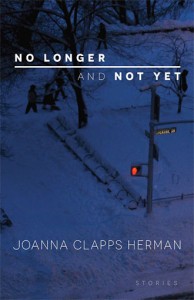 **Attention Writers! Joanna Clapps Herman leads “How Life Becomes Fiction,” a craft talk, on Thursday, September 18. Details on our News and Events page.**
**Attention Writers! Joanna Clapps Herman leads “How Life Becomes Fiction,” a craft talk, on Thursday, September 18. Details on our News and Events page.**
No Longer and Not Yet, by Joanna Clapps Herman, offers linked short stories about the city is at its best. The book teems with unique souls that somehow, serendipitously, come together in community, spin apart, find one another again. The Upper West Side is a world full of possibility in this collection, and Ms. Herman shows us how its denizens’ intimacies and adventures, their devotion to one another and to the place they call home, render the city not such a large place after all.
Unlike a lot of urban writers portraying individuals as the city’s central characters, Herman makes families New York’s foundation. Individuals often seek out the city in order to assert themselves, their capacity for making unique choices. Herman’s families build urban lives to reveal that while strong individuals remain unique, they are willing to limit individual freedoms for the sake of loving relationship. In the book’s central series of stories, Tess and Max fall in love, marry, and raise their son Paul to the brink of high school graduation, with sweetly understated drama.
The first of the collection’s title sequence of stories, “No Longer,” has Tess proposing to Max. “All her life Tess had been waiting for fate to arrive on winged feet with a whir and a portentous breeze placing before her what her life would be about… Was Max her winged fate or a disturbance in the weather? Tess wasn’t sure. She knew she could not let the winds blow past her this time.” In the second, “Not Yet,” Tess considers leaving Max, who refuses to father another child after the failure of his first marriage. But when he confesses that he cannot bear losing her, and decides another child will be worth it if she will only stay, Tess meets him with uncertainty.
“Oh Max, we haven’t figured out how to be married. How can we have a baby?
“Oh, we’ll make a mess. I promise. The kid will wonder how we ever had the nerve to think we could be parents. My daughter will explain what a bad deal it’s getting. She’ll write a song about it. It will be broadcast on the radio.”
…Tess considered this, considered the currents of her husband’s weather flowing over her.
Not every family in No Longer Not Yet falls into Tess and Max’s more or less traditional patterns. Naomi, an artist, has a child with Eliot, then grows into a strong single mother. David and Sophie, immersed in intriguing professional lives, wrestle with whether to have children at all. Leah and Aaron navigate precarious parenting waters as their troubled preteen daughter appears to reject her new baby brother. Ambitious, brilliant Esther juggles marital infidelity, motherhood, weight issues, and chronic quitter’s syndrome during years of psychotherapy, in “Taking an Incomplete,” the collection’s most volatile story. In Esther, the struggle of the individual within the family bubbles closest to the surface, threatens to explode the family’s carefully tended order.
Herman touches on a universal nerve by setting these stories in the city, where individuality crosses into psychosis in characters like the homeless Flower Lady and the cardboard-box hermit, tended to by Leah in “Seeding Memory” and “Snow Struck.” The family hovers in the balance between the individual’s desires for normalcy and uniqueness. As we step into maturity and head up families of our own, we often feel as if we are navigating those extremes exclusively: immerse ourselves in family and lose our individuality, reject the confines of family and lose our minds.
The families in No Longer Not Yet teeter as they walk that balance, but they do not fall. This is not a collection that explores disaster or abysmal loss. If anything, Herman explores the truths of what we perceive as urban success, normalcy, and individuality in a world where long-term relationship, the touchstone of humanity, is often hidden behind the heroic myths portrayed in news and popular media. No Longer Not Yet reveals the city as an unsensational, even sensible place, where families do what they do everywhere. Schedule work and play, juggle the nuts-and-bolts of daily life, and work hardest at feeding the love that brought them together in the first place.